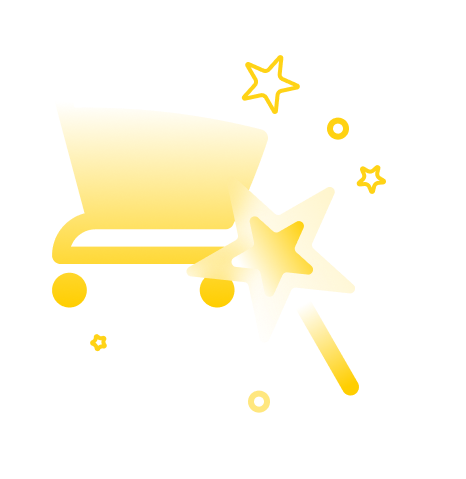Excerpt: Customers often fill up their carts with different products of interest only to abandon them halfway or towards the end of the checkout process – this is detrimental for small-scale businesses. Need to counter this problem? This blog discusses various customer re-engagement strategies that you can successfully implement to do so.
Introduction
Enticing new customers to fill up their carts is already hard enough, and the last thing you want is for them to quit halfway. Cart abandonment is a significant deterrent that plagues almost all businesses, be it small-scale enterprises or commercial brands.
While you cannot entirely eliminate cart abandonment, you can follow specific steps to minimize it and achieve high conversion rates. Re-engaging customers is pivotal to ensuring that they stay loyal to you.
Connecting with the Customers: Acquiring Contacts
While there are different strategies to re-engage customers, most of them are redundant if you don’t have their contact information.
Customer contact information is pivotal for all re-engagement strategies since it establishes a communication line between you and your existing customers.
Brand message delivery, which could include discounts, promotions, product launches, and more, will not reach the customers if you do not have their email addresses or phone number.
Often, prospects don’t convert due to high prices or a lack of offers. You can eliminate this hindrance by offering them limited-period discounts and bundle offers to bring them back to their abandoned carts.
You can collect customer contact information by –
- Setting up a customer database
- Asking for email addresses or contact numbers during checkout
- Initiating customer loyalty programs
- Providing free in-store WiFi to acquire contact information
Customer Re-Engagement Tips and Strategies
If your business is plagued by cart abandonment, then you must follow the following tips and strategies for customer re-engagement and higher conversion rates:
1. Understand the Reasons for Customer Disinterest
Before you delve into brainstorming strategies for customer re-engagement, figure out what disengaged them in the first place. There could be plenty of reasons that drive potential customers toward cart abandonment.
- Skepticism about Credibility – Customers are not always comfortable purchasing from e-commerce outlets. This skepticism stems from requiring them to share their debit/credit card details. You can establish credibility by offering social proof, redirecting customers to secure transaction platforms, and offering a generous return policy.
- High Shipping Charges – One of the most common reasons for cart abandonment is high shipping charges, which brands reveal towards the end of the checkout process. To circumvent this, offer free shipping promos or disclose the shipping charges at the beginning of the checkout process.
- Complex Navigation – Online buyers have a brief attention span and will be driven towards cart abandonment if the checkout process is complicated or time-consuming. To avoid this, make the checkout simplistic and easy to navigate.
- Insufficient Modes of Payment – Not all customers have multiple payment choices at their disposal and can only complete a purchase if their preferred method is offered. Offer mainstream payment methods used most commonly, such as UPI, credit/debit cards, and more.
2. Gather Feedback on Social Media
People use social media as a feedback tool for different brands and often share their complaints online to have their voices heard. According to research, 47% of shoppers will use social media to voice their opinions and grievances.
Customers who share brand complaints on social media expect a response as soon as possible. You must leverage this opportunity and put your customer service team to work by having them monitor brand mentions or tags.
Respond to posts, tweets, and comments to showcase customer service quality. If you can successfully iron out the issue and satisfy customer requests, you will have established a reputation for your brand on social media.
You can also ask satisfied customers to write online reviews since it can boost your credibility in front of potential customers. Most people will not bother writing a product review unless you incentivize them. You can receive more insightful feedback by offering rewards in exchange. For instance, you could offer 20% off to customers on their next purchase if they fill out a feedback form genuinely.
It’s also crucial to follow up on responses swiftly. If a customer inquires about a product or a service, try responding within a few hours. Quick responses keep you at the top of customers’ minds and significantly drive your re-engagement campaign success.
3. Deliver Informative Content in Emails
People these days are flooded with marketing phone calls and text messages all day long. Rather than calling them to inquire about their abandoned cart, re-engage your customers by sending emails with insightful information.
Prepare a short note for each of your prospects, accompanied by informative content such as a newsletter about their niche, an article of their interest, or other types of content that might entice them to complete the purchase.
Based on the items in their cart, make the note as personalized as possible to express genuine interest in their purchase. This modest act will promote relationships between you and the customers and land a positive impression.
4. Add a Touch of Personalization
Communication with your customers can be enhanced by personalizing your relationship with them. Be it in the form of a call, text, email, or any other medium, be sure to personalize the message based on their cart’s contents.
Here are some benefits of personalizing content for your prospects:
- Engaging Content – Personalized content engages customers like nothing else and often drives them to complete the purchase. Personalization also promotes customer loyalty.
- Expressing Genuine Interest – If your prospects receive a personalized email or call regarding the products they abandoned in the cart, it will convey the feeling that you genuinely care about their interests and purchases.
- Positive Word of Mouth – Personalization increases the satisfaction rate of customers. More happy customers lead to more recommendations and positive word of mouth about your brand.
5. Digital Re-Targeting
Digital re-targeting is a remarkably effective way to re-engage buyers in a way that does not require their contact information.
Digital re-targeting involves placing cookies on or tagging potential buyers when they visit your website or social media handles and categorizing them based on their navigation through different pages and engagement with your website.
Then, you can display ads based on the audience categories using Google Display and social media PPC ads. This approach helps you get in front of interested prospects and old shoppers with no contact information necessary to establish communication.
6. Clarify Your Purpose of Calling
Each time you ring up your prospects for re-engagement purposes, make sure that you have a clear purpose and agenda for the same. Act professionally but also a bit laid back to establish friendly communication with your customers.
Be sure to have a rational purpose in mind upon hitting up your prospects with phone calls. You could inform them of a newly-launched offer on a series of products or notify them about a special discount going on this week. Since most people are busy during the day, you must make the call worth their time to convince them to complete the purchase.
7. Schedule Customer Interactions
You can follow up with your prospects conveniently if you have set a schedule based on your work routine. Most CRM (Customer Relationship Management) tools offer scheduling features that let you schedule follow-up calls, text messages, emails, and more.
These CRM tools help you keep track of appointments, manage time more effectively, and dedicate more time towards core company tasks to ensure a higher influx of profits.
CRM tools also provide you with a detailed list of sales prospects who did not convert over the years for various reasons. Leverage this opportunity to re-target them and deliver an update on the latest developments of your product or service.
You must also schedule interactions to meet the customers’ expectations. For instance, if your company has several appointments pending and you know you cannot keep up with all of them, allot a specific schedule to the customers and buyers.
Scheduling can also help you allot work more effectively to colleagues who have some free time at their disposal so that you can allot some of your appointments to them.
8. Launch Fun Return Promotions
If you’re re-targeting previous customers, your job gets simpler since they’re already aware of your brand and the products and services you have to offer. All you need is to give them a little nudge to spark their interest again.
You can deliver this subtle push in the form of a fun and enticing return promotion, which could include:
- Organizing a giveaway.
- Sponsoring a contest.
- Offering state-of-the-art features in new product launches.
- Offering a discount or coupon for each successful referral.
You can also create a sense of community to make customers feel like they are part of a valuable group. For instance, ask them to join your email list, regardless of completing the checkout process. You can also go for something tangible, such as creating an online forum, Facebook group, or on-site membership to provide like-minded people with a platform to interact.
Final Words
Be it for existing customers or prospects, implementing practical approaches to minimize cart abandonment is crucial. From being transparent about product-related and shipping costs to re-targeting prospects using social media and personalizing your messages, customer re-targeting involves devising well-thought strategies.
If you are looking for more insights into personalization and seek the help of professionals, visit Glood.AI, a leading personalization and commerce experience platform that delivers an engaging shopping experience for your customers.







